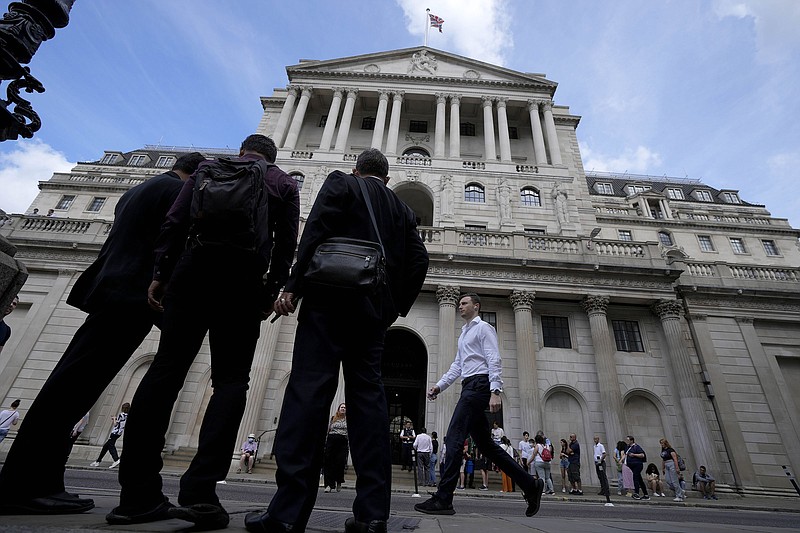The Bank of England unleashed its biggest interest-rate increase in 27 years as it warned the U.K. is heading for more than a year of recession under the weight of soaring inflation.
Overall, the approved half-point increase pushes the bank's key interest rate to 1.75%, the highest its been since the depths of the global financial crisis in December 2008.
The move looks to draw down galloping consumer prices driven by soaring energy costs as Russia restricts natural gas to Europe and further cuts are a risk, Bank of England Gov. Andrew Bailey said.
The rate increase Thursday was backed by eight of the central bank's nine policymakers, who also kept up a pledge to act forcefully again in the future if needed.
"The committee will be particularly alert to indications of more persistent inflationary pressures, and will if necessary act forcefully in response," Bailey told reporters in London. "All options are on the table for our September meeting, and beyond that."
Only Silvana Tenreyro backed a smaller move, saying rates may already have reached a level consistent with returning inflation to target and flagging worries about squeezed household incomes.
The pound slid after the Thursday decision, which was accompanied by warnings that a U.K. recession will begin in the fourth quarter and last all the way through next year.
That would be the longest slump since the financial crisis, with officials expecting the economy to shrink overall by about 2.1%.
Bank of England forecasts, based on a market path for benchmark borrowing costs that peaks at 3% next year, show the economy contracting about 1.25% in 2023 and a further 0.25% the following year.
The central bank, meanwhile, boosted its forecast for the peak of inflation to 13.3% in October amid a surge in gas prices, and warned that price gains will remain elevated throughout 2023. That will sharpen a cost-of-living crisis that will see real disposable incomes fall more than at any time in some 60 years.
Even after billions of pounds of government support for struggling households, families are set to be around 5% worse off by the end of 2023 with incomes falling both this year and next.
Unemployment is expected to climb to 6.3% by 2025.
"It's hard to recall a bleaker outcome to a central bank meeting than we got from the Bank of England," said Brian Nick, Chief Investment Strategist at Nuveen. "It's clear that the MPC is opting to try to 'crush' inflation -- to the extent a central bank can help push down energy prices -- by hiking interest rates quickly even if it comes at the expense of economic growth."
The bleak outlook in the world's fifth-largest economy shows the ripple effect of the war, with people mired in a cost-of-living crisis that has surged the cost of everything from groceries to utility bills.
And it lays bare the difficult position that central banks worldwide are facing: how to control surging inflation without tipping economies into recession that were just beginning to recover from the coronavirus pandemic.
While the Bank of England was the first major central bank to raise rates after the pandemic, and has moved at every meeting since December, it had thus far stuck to smaller, more usual increases.
That left it at risk of falling behind the curve, with some 70 other counterparts having shifted by a half-point or more this year.
The Federal Reserve has raised rates by 75 basis points at its last two meetings, while even the European Central Bank kicked off its cycle in July with a half-point rise.
Dean Turner, an economist at UBS Global Wealth Management, said he did not envy the Bank of England's position.
"What is a central banker to do?" he asked. "Should they be prioritizing current inflation, most of which is driven by factors beyond the control of the Bank of England, or the faltering growth backdrop?"
The issue feeds into an increasingly acrimonious debate about who is responsible for growing cost-of-living crisis.
The Bank of England has been blamed in some quarters for acting too slowly in face of the growing inflation threat, and Liz Truss, who is favored to win the race to replace Boris Johnson as prime minister, has vowed to sharpen the central bank's mandate if she takes power.
Among a flurry of potential outcomes, the contest for the leadership has made the task of forecasting the economy harder. The final two candidates are offering widely differing views on tax cuts and borrowing levels, with Truss advocating the more radical path.
By convention, the Bank of England bases its forecasts on announced government policy, so the predictions don't take into account anything brought up during the campaign.
The last time the U.K. approved a similar interest rate increase was December 1994, when those decisions were still made by the government's treasury chief in consultation with the central bank governor.
Information for this article was contributed by David Goodman, Libby Cherry, Harumi Ichikura, Mark Evans, Zoe Schneeweiss, Alice Gledhill and Niraj Shah of Bloomberg News, as well as Danica Kirka of The Associated Press.
